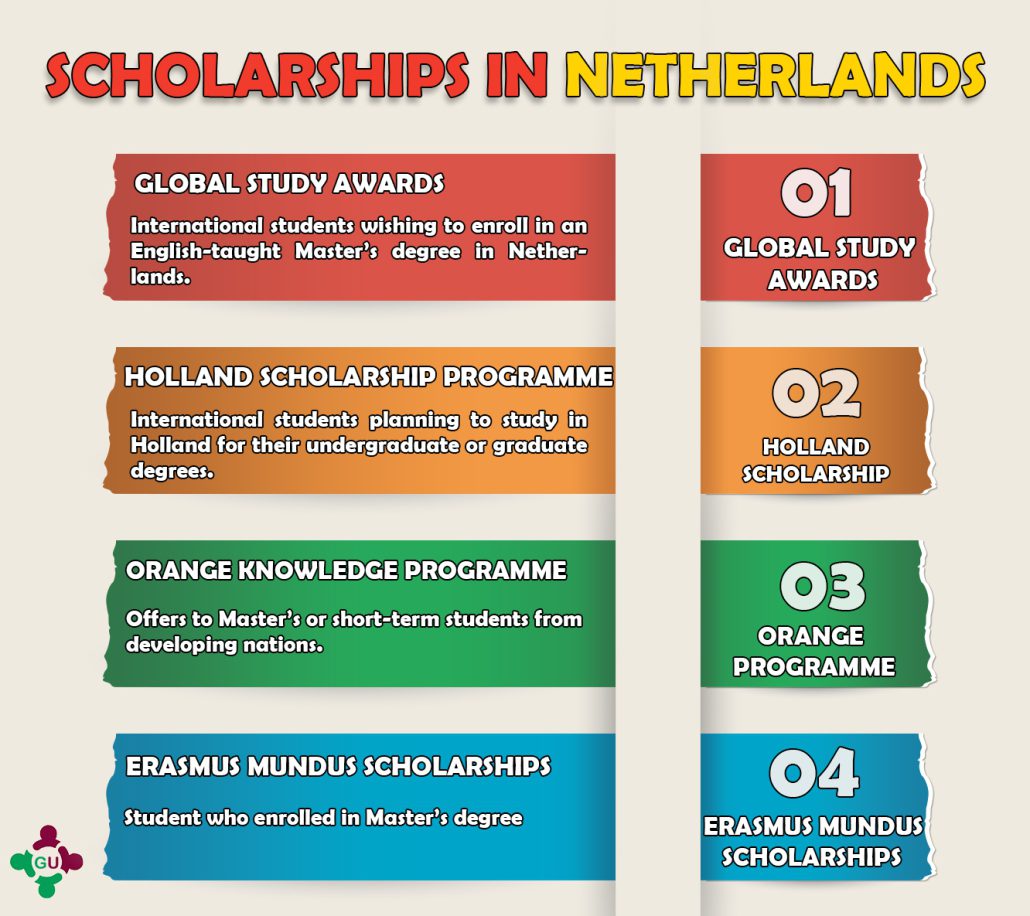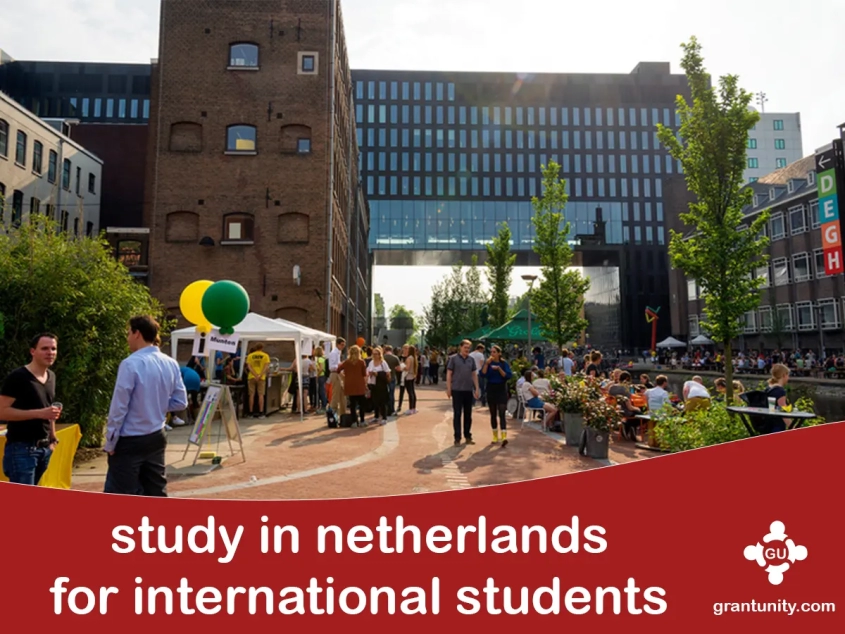Study in Netherlands
Estimated reading time: 18 minutes
Embarking on the journey of studying in the Netherlands presents a unique opportunity for those seeking an unconventional educational experience while charting their global path. Many international students are drawn to this European nation, known for its iconic bulb fields, picturesque canals, and a lifestyle exuding opulence. Pursuing study in Netherlands appeals to those desiring a distinctive academic and cultural experience. This country hosts some of the world’s highest-ranking universities, offering a cutting-edge educational environment, an enriching student life, and a welcoming atmosphere.
For adventurous students fueled by wanderlust, studying in the Netherlands is an excellent opportunity to explore new horizons. Proximity to Germany and Belgium adds an extra dimension to the experience, providing the chance to effortlessly cross borders and immerse oneself in the diverse cultural tapestry of Europe. This geographical advantage enriches the academic journey, fostering cross-cultural interactions and a deeper understanding of the region.
Furthermore, the Netherlands is a hub for academic excellence, with institutions consistently ranking among the world’s best. The cutting-edge educational programs, coupled with a focus on innovation and research, ensure students receive a high-quality education, preparing them for the challenges of the modern world.
Beyond academia, the Netherlands offers a vibrant student life featuring cultural events, social activities, and a dynamic community. The warm and inclusive environment facilitates easy integration for international students, creating a sense of belonging that extends beyond the classroom.
Choosing the Netherlands as your study destination transcends academic considerations. It’s an opportunity to explore a rich and diverse culture, traverse various landscapes, and broaden your horizons in the heart of Europe. The country’s proximity to neighboring nations adds an extra layer of cultural richness, making it an ideal choice for those seeking an educational adventure that transcends borders. If you’re considering studying in the Netherlands, you’re embarking on a journey that combines academic excellence with a rich cultural experience, positioning you for success in a globalized world.

Education in Netherlands: Highlights
As an international student who wants to study in Holland, there are some key information that you should know. Here’s a list of those important details:
| Criteria | Description |
| Instruction language | English or Dutch |
| Required language test | IELTS, TOEFL, PTE, GRE, GMAT |
| Average tuition & fees | €10,000 – €52,000/ year |
| Average living cost | €1,500 – €3,000/ month |
| University funding sources | Grants, Scholarships, and part-time jobs |
| Intakes period | Two intakes every year. February-March and July-September |
| Student visa type | Long-term student visas and residency authorization |
| Degree levels | Diploma, Undergraduate (Bachelor’s), and Graduate (Master’s and Ph.D.) |
| Top courses | Agriculture, liberal arts, sciences, engineering, sports management, philosophy, business, and finance, among other fields. |
Why should I study in Netherlands?
Studying in the Netherlands offers a multitude of compelling reasons, making it an attractive destination for international students. Here are several key factors that make the Netherlands an excellent choice for your academic journey:
- Top-Quality Education: The Netherlands is home to some of the world’s top-ranking universities known for their academic excellence and innovative teaching methods. The education system places a strong emphasis on research and practical skills, ensuring students are well-prepared for their future careers, enhancing the value of choosing to study in Netherlands.
- English-Taught Programs: Many academic programs are offered in English, making it accessible for international students. This ensures a smooth transition and facilitates effective communication in and outside the classroom, a significant advantage for those who study in Netherlands.
- Diverse Range of Programs: The Netherlands provides a diverse array of academic programs, catering to various fields of study. Whether in STEM disciplines, humanities, social sciences, or the arts, there’s a program suited to your interests and career goals, making study in Netherlands a versatile option.
- Innovative Teaching Methods: The Dutch education system encourages interactive learning, critical thinking, and independent problem-solving. Classes often involve group projects, discussions, and real-world applications of knowledge, a core aspect of the experience when you study in Netherlands.
- International Environment: The Netherlands is known for its multicultural and inclusive society. Studying here exposes you to a global community, fostering cross-cultural understanding and providing networking opportunities with peers from around the world, a highlight of deciding to study in Netherlands.
- High Quality of Life: The Netherlands consistently ranks high in global quality of life indices. Its well-developed infrastructure, healthcare system, and social services contribute to a comfortable and enjoyable living experience for those who choose to study in Netherlands.
- English-Speaking Environment: The widespread use of English in daily life and business makes it easier for international students to navigate and integrate into Dutch society, an essential benefit for those who study in Netherlands.
- Work Opportunities for Students: The Netherlands allows international students to work part-time during their studies, providing valuable work experience and an opportunity to offset living expenses, which is crucial for students who study in Netherlands.
- Innovation and Research Opportunities: The country is at the forefront of innovation and research, particularly in fields such as technology, engineering, and sustainable development. Students have access to cutting-edge facilities and collaborative research projects, a key advantage of choosing to study in Netherlands.
- Beautiful and Safe Environment: The Netherlands boasts picturesque landscapes, historic cities, and a safe living environment. The Dutch commitment to environmental sustainability contributes to a high quality of life, enjoyed by those who study in Netherlands.
- Bilingual Population: Many Dutch residents are bilingual, adding another layer of linguistic diversity and facilitating interactions for non-Dutch speakers, making it easier for international students who study in Netherlands.
- Global Career Opportunities: A Dutch degree is highly regarded internationally, opening up diverse career opportunities globally. The Netherlands has a robust job market, particularly in sectors such as technology, engineering, and business, benefiting graduates who study in Netherlands.
- Travel Opportunities: The central location of the Netherlands in Europe allows for easy travel to neighboring countries, providing the chance to explore different cultures and landscapes, a fantastic perk for students who study in Netherlands.
Educational system in Netherlands
The educational system in the Netherlands is known for its high quality, innovation, and international orientation, structured to provide a well-rounded education emphasizing critical thinking, creativity, and practical skills. Here’s how the system caters to students looking to study in Netherlands across different levels:
- Early Childhood Education:
- Early childhood education is not mandatory but widely available for children aged 2 to 4.
- Kindergartens and pre-schools focus on social development, language skills, and basic numeracy, preparing them for future formal education if they choose to study in Netherlands.
- Primary Education:
- Compulsory education starts at the age of 5.
- Primary education spans eight years (ages 4 to 12), focusing on fundamental skills such as reading, writing, and arithmetic, forming a solid foundation for those who continue to study in Netherlands.
- Emphasis on interactive learning and developing social skills.
- Secondary Education:
- Secondary education (ages 12 to 16) is divided into VMBO, HAVO, and VWO levels.
- VMBO prepares students for vocational training, while HAVO and VWO are more academically oriented, suited for those aiming to study in Netherlands at higher education levels.
- Students choose specific tracks based on academic interests and career goals.
- Upper Secondary Education (Ages 16-18):
- HAVO and VWO students continue for an additional two or three years.
- Successful completion of VWO grants access to university education, facilitating a seamless transition for those planning to study in Netherlands at a university level.
- HAVO graduates may pursue higher professional education (HBO).
- Higher Education:
- Dutch higher education is divided into HBO and WO.
- HBO programs are practical and profession-oriented, perfect for students who study in Netherlands and prefer a hands-on approach.
- WO programs emphasize theoretical knowledge and research skills, ideal for those focused on academic and research careers while they study in Netherlands.
- Bachelor’s Degree:
- Bachelor’s programs typically last three years, focusing on independent study, critical thinking, and practical knowledge applications, crucial for international students who choose to study in Netherlands.
- Master’s Degree:
- Master’s programs generally last one to two years and are research-based, including internships or practical projects, providing advanced knowledge for those who study in Netherlands.
- PhD (Doctorate):
- PhD programs are intensely research-focused, typically taking four years to complete, appealing to those who commit to long-term studies and contribute original research while they study in Netherlands.
- Grading System:
- The grading system ranges from 1 (very poor) to 10 (outstanding), with a pass considered 5.5 or higher, maintaining high standards for students who study in Netherlands.
- Internationalization:
- Many programs are offered in English and include exchange programs and collaborations with universities worldwide, enhancing the global perspective for students who study in Netherlands.
- Student Life:
- Universities promote vibrant student life with numerous extracurricular activities, student associations, and cultural events, enriching the experience for those who study in Netherlands.
- Funding and Tuition:
- While higher education is subsidized, keeping tuition fees relatively affordable for Dutch and EU/EEA students, non-EU/EEA students have higher fees but can access scholarships and financial aid, making it feasible to study in Netherlands.
- Quality Assurance:
- The system is subject to rigorous quality assurance measures, ensuring a consistently high standard of education for all students who choose to study in Netherlands.
Credit Criteria in Netherlands
In the Netherlands, completing your education requires earning credits through the European Credit Transfer and Accumulation System (ECTS). Here’s how it works:
- Credits are awarded based on your engagement in various activities like lectures, seminars, assignments, lab work, independent study, and exams.
- A full-time academic year typically comprises around 60 credits, with students receiving 30 ECTS per semester.
- Each credit corresponds to approximately 28 hours of work, meaning you’ll need about 1,680 hours to complete the learning outcomes of a full-cycle program.
Netherlands is home to a number of prestigious universities, as shown in the table below:
| Institution name | THE Ranking | Portion of international students | Avg. tuition & fees |
| Wageningen University & Research | 53 | 27% | €17,000/year |
| University of Amsterdam | 65 | 29% | €12,000-€22,000 |
| Utrecht University | 69 | 11% | €12,000-€22,000 |
| Leiden University | 71 | 19% | €12,000-€18,000 |
| Erasmus University Rotterdam | 72 | 22% | €12,000-€24,000 |
| Delft University of Technology | 75 | 31% | €15,000-€22,000 |
| Vrije Universiteit Amsterdam | 115 | 14% | €12,000-€26,000 |
| Radboud University Nijmegen | 139 | 15% | €12,000-€20,000 |
| Eindhoven University of Technology | 201-250 | 22% | €10,000-€19,000 |
Top courses in Netherlands
Higher education institutions in Netherlands provide a wide variety of course options. The following are a few of the top courses in Netherlands for foreign students:
- Agricultural
- Liberal arts
- Sciences
- Engineering
- Fashion
- Philosophy
- Business and Finance
The most well-liked courses chosen by students in Netherlands are:
| Course | Duration | Avg. tuition & fees |
| BSc in Business Management | 3-4 years | €6,000-€18,000 |
| MSc in Engineering | 1/5-3 years | €8,000-€35,000 |
| MSc in Architecture | 1/5-3 years | €8,000-€22,000 |
| MA in Humanities | 2-3 years | €8,000-€36,000 |
| Bachelor of Law (LLB) | 2-3 years | €8,000-€26,000 |
| Master of Business Administration | 1 year | €10,000-€40,000 |
Admission Process of Universities in Netherlands

Fully SEO Optimized Article including FAQ’s
The admission process for universities in the Netherlands is generally straightforward but may vary slightly depending on the institution and the level of study. Below is a step-by-step guide to the typical admission process for undergraduate and postgraduate programs, specifically tailored for students looking to study in Netherlands:
Undergraduate Admission Process:
- Choose a Program:
- Select the undergraduate program you wish to pursue that aligns with your academic and career goals, ideal for your plans to study in Netherlands.
- Check Admission Requirements:
- Review the specific admission requirements for your chosen program on the university’s official website. This step is crucial for ensuring you meet all criteria to study in Netherlands.
- Check Application Deadlines:
- Be aware of application deadlines. Deadlines can vary, so check the university’s website for accurate information, ensuring you stay on track to study in Netherlands.
- Meet Academic Requirements:
- Ensure you meet the academic qualifications required for admission, typically involving having completed the equivalent of Dutch VWO education, a key step to study in Netherlands.
- Language Proficiency:
- Demonstrate proficiency in English by providing scores from recognized language tests like IELTS or TOEFL, essential for those choosing to study in Netherlands.
- Submit Application:
- Complete the online application form provided by the university and submit all required documents, paving the way to study in Netherlands.
- Pay Application Fees:
- Pay any required application fees. These fees may vary between universities but are a necessary step to study in Netherlands.
- Wait for Admission Decision:
- Once the application is submitted, wait for the university to process your application and provide an admission decision, a period of anticipation for those planning to study in Netherlands.
- Accept Offer and Enroll:
- If accepted, accept the offer and follow the instructions to enroll in the program, finalizing your plans to study in Netherlands.
Postgraduate Admission Process:
- Choose a Program:
- Select a postgraduate program that aligns with your academic and career goals, another critical decision for those aiming to study in Netherlands.
- Check Admission Requirements:
- Review the specific admission requirements for your chosen program, a necessary step to advance your education and study in Netherlands.
- Check Application Deadlines:
- Be aware of application deadlines and ensure you submit your application on time to continue your plans to study in Netherlands.
- Submit Application:
- Complete the online application form and submit all required documents, another step towards your goal to study in Netherlands.
- Language Proficiency:
- Demonstrate proficiency in English, essential for anyone looking to successfully study in Netherlands.
- Research Funding and Scholarships:
- Explore available funding options and scholarships for international students, crucial for managing finances while you study in Netherlands.
- Interview (if required):
- Some programs or universities may require an interview as part of the selection process, a potential step for those pursuing postgraduate studies to study in Netherlands.
- Wait for Admission Decision:
- Wait for the university to process your application and provide an admission decision, crucial for your journey to study in Netherlands.
- Accept Offer and Enroll:
- If accepted, accept the offer and follow the instructions to enroll in the program, solidifying your academic path to study in Netherlands.
- Visa Application:
- If you are a non-EU/EEA student, you may need to apply for a student visa or residence permit, a necessary step to legally study in Netherlands.
- Arrival and Registration:
- Upon arrival, complete any necessary registration procedures with the university and local authorities, marking the start of your experience to study in Netherlands.
Each of these steps is designed to ensure a smooth transition for those embarking on their academic journey to study in Netherlands, from initial application to final enrollment.
Admission requirements in Universities in Netherlands
You must satisfy a number of requirements depending on the course you want to study in Netherlands. If you check off all of the boxes below, your admission application will be taken into consideration:
| Degree type | Requirements |
| Diploma certificate | 1-10th and 12th certificates 2-IELTS/TOEFL for English 3-CNaVT/ NT2 for Dutch 4-Some diplomas might need previous work experience in the field. |
| Undergraduate (Bachelor’s) Degree | 1-12th standard certificate with the minimum of 75% 2-IELTS/TOEFL for English 3-CNaVT/ NT2 for Dutch 4-Some universities or courses might also require a diploma to pursue a Bachelor’s |
| Graduate (Master’s) Degree | 1-Bachelor’s degree in any relative field. For research-oriented programs, the Bachelor’s degree should also be a research-oriented one. 2-The average GPA score required is 75% or higher on a 100% scale. Minimum GRE score of 310 to 330 or GMAT score of 600. 3-IELTS with a minimum score of 6 or TOEFL with 80. 4-CNaVT/ NT2 for Dutch 5-CV, LORs, and SOPs |
| Doctorate Degree | 1-Master’s degree in the field in which you are interested in conducting your research. 2-Relevant Research/ Work Experience 3-CV 4- SOP |
Education cost in Netherlands
The cost of studying a particular program and university in Netherlands varies depending on the student’s lifestyle. Tuition fees and cost of living are the two main components of the entire cost of education.

| Degree type | Avg. tuition & fees/year |
| Bachelor’s Degree | €6,000-€16,000 |
| Master’s Degree | €6,000-€26,000 |
| Doctorate Degree | €6,000-€28,000- varies depending on the program |
2-Living costs for international students to Study in Netherlands
International students’ expenses in Netherlands vary depending on their way of living. A foreign student must pay various costs to study in Netherlands, including:
| Criteria | Avg. living cost/month |
| Apartment housing, including utilities | €500-€1,500 |
| Books and supplies | €30-€70 |
| Food | €50-€150 |
| Miscellaneous | €100-€200 |
Top cities for international students in Netherlands
Despite being a small country, Netherlands offers a variety of cities where you can pursue your further education. Some of the top cities for international students to study in Netherlands are listed below:
| City | Avg. living cost/month | Top Universities |
| Amsterdam | €900-€1,100 | University of Amsterdam, Vrije Universiteit Amsterdam, Amsterdam UMC |
| Utrecht | €900-€1,100 | University College Utrecht, Utrecht University, University of Humanistic Studies |
| Rotterdam | €800-€1,200 | Rotterdam University of Applied Sciences, Erasmus University Rotterdam, Rotterdam University of Applied Sciences |
Student visa in Netherlands
If you are admitted to a university in Netherlands, you don’t need to deal with the visa process for too long.
-You can choose between a Schengen visa and a short-stay visa if your course in Netherlands will last less than 90 days.
-You will need an entry visa (MVV) and a residence permit (VVR) if you are enrolling in a recognized long course in Netherlands.
The steps for obtaining a student visa for Netherlands are listed below:
- Initiate your visa application after being admitted to your preferred university.
- Once you’ve finished the visa initiation process, submit your visa application to the embassy or consulate.
- Submit your application after paying the visa fees.
- Attend your interview for a visa.
- It could take up to a month for your visa application to be accepted.
- Get your MVV.
Documents for a visa in Netherlands
- The visa application form was completed, and two photos
- Birth certificate and a valid passport
- transcripts of previous academic degrees
- Official admission letter from a university in Netherlands
- A study plan (Explain why you are drawn to that area of study in particular. How and why does it relate to what you’ve already learned?
- Proof of financial capability for the entire study period (approximately 870 EUR per month)
- Health and travel insurance
- Application fee for the visa (€170)
- Photocopies of all the original documents
- Test for tuberculosis (required for citizens from some countries)
Top scholarships to Study in Netherlands
A variety of government-funded, nonprofit organization-funded, and university-funded scholarships are offered to international students in an effort to attract bright minds to study in Holland.

In Netherlands, there are various scholarships available, as shown in the table below:
| Scholarship name | Who is eligible? | Benefits/amount |
| Global Study Awards | International students wishing to enroll in an English-taught Master’s degree in Netherlands. | €9,000-€12,000 |
| Holland Scholarship Programme | International students planning to study in Holland for their undergraduate or graduate degrees. | €4,000-€5,000 in the first year |
| Orange Knowledge Programme | Offers to Master’s or short-term students from developing nations. | Covers living expenses, education costs, health insurance, etc. Additionally, students receive a set monthly payment while they are in school. |
| Erasmus Mundus Scholarships | Coverage of tuition fees, insurance, travel costs, etc. | Coverage of tuition fees, insurance, travel costs etc. |
| University-Based Scholarships | Students enrolled in Holland Universities. They grant a reduction or coverage of tuition fees and offer additional scholarships based on Merit. Universities included are University of Maastricht, Radboud University, Utrecht University, University of Groningen, VU University Amsterdam, University of Twente offer such scholarships. | A scholarship for living expenses, travel, insurance, or tuition reduction. |

Job opportunities in Netherlands for students
Many higher education institutions provide internships, networking opportunities, and exposure to international students. Your professional career is affected by your degrees and collaboration skills from your education in Netherlands.
International graduates are in high demand in Netherlands. There are a lot of open positions and not enough individuals to fill them. Top employers in Netherlands include Shell, Airbus, ING group, Philips, and others. Following a Master’s degree, there are several excellent work options in Netherlands, including:
| Job Opportunity | Avg. income/year |
| Engineering | €60,000-€75,000 |
| Management | €70,000-€80,000 |
| Data Science | €63,000-€75,000 |
| Research | €50,000-€60,000 |
| Medicine | €88,000-€95,000 |
PR (permanent residency) and work visa in Netherlands
Netherlands gives international students one year as an orientation year to encourage hiring highly qualified foreign professionals.

When international students graduate and want to look for work, they are given the orientation year as a grace period or permission. Once employed, you are allowed to remain in Netherlands for the duration of your employment. Keep in mind that you will have to abide by a few requirements while working there. There are:
1-A registered sponsor for highly skilled workers must be your employer.
2-Your pay must be at least as much as the required minimum wage.
| Age range | Avg. income/Month |
| Highly skilled immigrants must be at least 30 years old | €4,000-€5,000 |
| Highly skilled immigrants younger than 30 years old | €3000-€4,000 |
International students can benefit from studying in the Netherlands by switching to a work visa there. There are some official documents international students will need, including the following:
1-Work + Resident permit
2-A work permit
3-Long stay visa
4-Resident permit
After five years of employment or residence in the Netherlands, you can apply for permanent residency. International students can also climb the ladder of work visas and permanent residency by choosing to study in the Netherlands. This is possible if you opt for a job in great demand, such as engineering, data analysis, and more.
It might be a fantastic experience to decide to study abroad in the Netherlands. The friendly and open-minded nature of people is what enhances it. You should surely consider studying in the Netherlands, given its lifestyle, accessibility, affordable cost of living, and promising future.

Frequently Asked Questions: Study in Netherlands
Amsterdam is one of the most well-liked student cities in Netherlands. More than 100,000 students are housed there globally. For Indian students, studying in Amsterdam is one of the friendliest experiences available.
Although higher education in Netherlands is not free for foreign students, it is still generally accessible and affordable.
In Netherlands, most students choose to work while they are in school. International students are permitted to work either full-time in June, July, and August or 16 hours per week while enrolled in school as long as they have a current residence visa.
Students from the EU/EEA and those outside of it pay varying tuition rates at Dutch universities. As a result, the words Statutory tuition fee (for students from the EU/EEA) and Institutional tuition fee (for students from other international countries) are created.
It signifies a limited or small number. Each program has a set number of seats for the academic year.
When more applications than seats are available for a program with limited enrollment, the numerus fixus programme is used in the selection process.
To verify, get in touch with the university. As a result, applications may be submitted directly to the university or via Studielink.
Yes, to apply for the numerus fixus program through Studielink, you must do so before January 15.
In a particular academic year, only two numerus fixus programs accept applications. There are programs, such as those in dentistry, medicine, and numerus fixus, for which only one application may be submitted per academic year.
Applications for these programs will be reviewed from January 15 to April 15.
Check it out on Studielink. You’ll find out by April 15 if you’ve been accepted. You have one week to accept the offer before losing your ranking and losing your seat to the next applicant.
These are nothing more than foundational programs that teach students how to apply academic theory to real-world situations while also giving them English language instruction to help them meet the requirements of the Bachelor’s program. These are effective ways to aid students in adjusting to university life.
Yes, you must apply for a residence permit once you arrive in Netherlands if you are a non-EU student. After you submit the necessary paperwork, your university will typically apply on your behalf.
€170-€180
No, the Master’s program can also use it.
IELTS is a requirement. You can enroll in a 12-month preparatory course if your IELTS score is 5.0. The minimum IELTS score needed for a six-month preparatory course is 5.5.
No, you do not need Dutch insurance if you are under 30 and can continue to receive coverage from a health insurer in your country of residence.
Yes. You must obtain one within four months of landing a job. If you don’t get one, you must pay a steep fine of about $400-$500.
Prior to three months after your residence permit expires, you must apply for an extension.
It is approximately $400.



Leave a Reply
Want to join the discussion?Feel free to contribute!